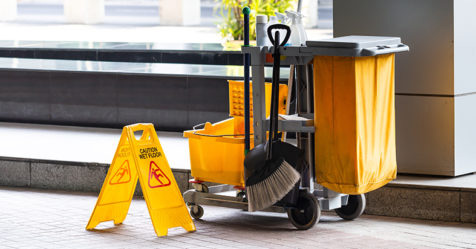As the old saying goes, “Cleanliness is next to godliness.”
But, in an industrial, institutional or work setting, cleanliness becomes something more earthbound — and, removing unwanted matter from surfaces is the real key in fighting malodors.
Foul smells in a building are typically caused by the presence of bacteria left to breed through either infrequent or inadequate cleaning procedures — possibly both.
Although odor problems can be prevalent in any area of a building, there are certain spots that tend to have more odor issues than others — primarily restrooms and break rooms.
Odors can be masked, but janitors, custodians and housekeeping personnel should strive to keep in mind that freshening the air is only a temporary solution that can actually make matters worse; masking air fresheners can combine with smells already present and result in an even more offensive odor than before.
Making the air smell nice only masks the odors and does not get to the root of the problem: The growth of bacteria.
Clearing The Air
For a short-term fix, an odor maintenance program can begin with the consistent use of air fresheners.
Select quality air fresheners that operate on a 24-hour basis and neutralize odor-causing bacteria rather than masking it.
Neutralizing odors also allows the fragrance, if there is one in the neutralizing product you’re using — to last longer and produces a fresh-smelling room.
But, instead of just covering odors up, a more effective method is the use of odor eliminators, which contain molecules that actually encapsulate the odor-causing bacteria and eliminate it from the air, leaving a fresh scent in the process.
Next, select a fragrance that complements the application and limits volatile organic compounds (VOCs) to meet Leadership in Energy and Environmental Design (LEED) certification criteria and comply with various safety standards.
A wise, and not overwhelming, fragrance choice leaves a lasting impression on employees and building occupants or guests, improving the overall ambiance of the facility.
Fragrance and scenting programs should be designed to enhance the environmental surroundings by matching the expectations affiliated with the specific area of the building.
For example, soft, mild floral fragrances such as gardenias or fruity citrus scents complement the relaxing environment a break room should convey.
Also, make sure the fragrance complements other scents in the area to create uniformity.
Competing fragrances contradict each other and can create an unpleasant experience.
While air fresheners and their scents provide the means to conceal unwanted odors in a specific room or space, they are really just Band-Aids.
To do more than cover up the odor, professional cleaners must determine the root cause and then treat it accordingly.
Getting To The Source
One of the worst sources of odor is urine.
Many in the cleaning profession use bleach to rid restrooms of that particular odor, and while it does work for a period of time, bleach is not a cleaner.
Products that clean, disinfect and sanitize are necessary to truly kill the bacteria and eliminate the odor source.
There are single products available on the market that do all three, making it easier for cleaning professionals to attack the problem more efficiently and in a labor-saving manner.
Soiled grout and the bacteria therein is a common cause of odor issues.
Again, it takes a three-pronged approach to eliminate the soils and the bacteria causing the odors: Cleaning, sanitizing and disinfecting.
Once it’s determined that grout is causing the odor problem, it may require multiple cleaning passes on the affected areas until the bacteria is finally removed.
Also, it may be necessary to apply an effective mold and mildew remover to the grout to aid in further odor prevention.
In restrooms, break rooms and many additional areas, odors can emanate from a sink, drain or other source of water.
The problem is typically not the sink or the drain itself but the sink trap below it, where hair, food particles and other debris are trapped — breeding bacteria and creating foul-smelling gases.
To combat this, there are several liquid cleaners on the market that contain enzymes that are poured down the drain and actually “eat” the bacteria, eliminating the cause of the odor and leaving a pleasant aroma in the process.
Surprisingly, dry drains have the tendency to create more unpleasant odors than frequently used drains.
An easy solution is to pour extra germicide/bactericide down drains to eliminate odors and bacteria.
Water dripping on cabinets and floors can also cause odors, so it’s a good idea to do a quick check under the sink and behind toilets and urinals in restrooms to make sure you don’t have leaky pipes or gaskets that need repair.
Vanguard Vigilance
Once you have eliminated the causes of your current odor problems, it’s important to develop a daily cleaning schedule to ensure that bacteria is not given the opportunity to breed.
Communicate your proactive program to all employees, ensuring that they use proper cleaning tools and chemicals and follow cleaning protocols.
Setting a schedule improves consistency throughout the entire facility and allows fragrances and cleaning agents to create a harmonic scenting scheme.
To help keep odors at bay in your facility, routinely take out the trash, wipe down counters and disinfect fixtures or other high-touch objects to remove odor causing bacteria and maintain a visibly clean environment.
To effectively clean surface areas, allow your disinfectants — after gross, visible soiling has been removed with a dedicated cleaning product — to dwell for the required time to kill bacteria and germs.
Products with faster kill times are desirable, as they allow labor-saving procedures and make it easier to use the product effectively.
In common areas like break rooms, make sanitizing wipes available for quick cleanups during the day.
Not only do they clean effectively but, since they are discarded afterward, the wipes virtually eliminate the chance of cross-contamination, which helps keep your workforce and building occupants safe and healthy.
Overall, unpleasant odors can cost a business customer loyalty, money and its reputation.
Eliminating the source of odors and implementing a customized odor maintenance program ensures an improved, more pleasant business environment for everyone.


